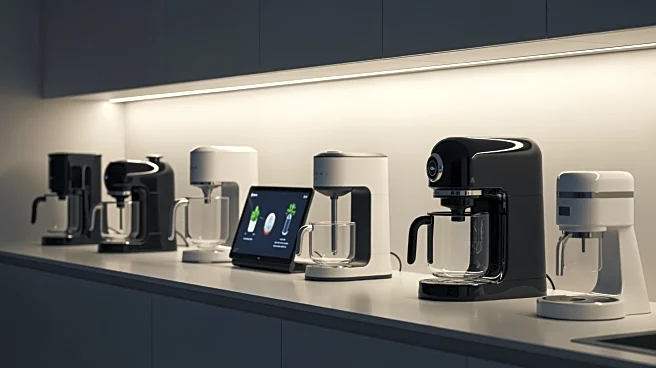What's Happening?
The food technology sector is undergoing significant changes as investor interests shift away from previously popular trends like plant-based meat alternatives. Hybrid meat is gaining traction as a more sustainable option, offering meat producers a way to reduce
their environmental footprint without sacrificing sales. Meanwhile, the interest in fermentation, particularly precision fermentation, is peaking and may pivot towards applications in pet food and cosmetics. Additionally, GLP-1 weight loss drugs are emerging as a major focus, presenting both opportunities and threats to the food industry. Water scarcity is also driving innovation, with food tech solutions increasingly focusing on wastewater reuse and technology to address this issue. Investors are now prioritizing business-to-business (B2B) food tech solutions that align with industry needs, such as alternatives to raw materials like cocoa and sugar reduction technologies.
Why It's Important?
These shifts in the food tech industry reflect broader changes in consumer preferences and economic conditions. The decline in interest in plant-based meat alternatives and the rise of hybrid meat suggest a move towards more sustainable and less noticeable changes in food products. The focus on GLP-1 drugs highlights the growing importance of health-related innovations in the food sector. Water scarcity solutions are crucial as climate change exacerbates resource shortages, particularly in Europe. The emphasis on B2B solutions indicates a strategic pivot towards addressing industry-specific challenges, which could lead to more targeted and effective innovations. Overall, these trends could reshape the food tech landscape, influencing investment strategies and product development.
What's Next?
As the food tech industry adapts to these new trends, companies that can demonstrate a clear pathway to profitability and align with industry needs are more likely to secure funding. The focus on capital efficiency and unit economics suggests that investors will be more cautious, prioritizing projects with shorter timelines to market. This could impact the development of novel technologies like cultivated meat, which face longer timelines and higher uncertainty. The industry may also see increased collaboration between food tech companies and traditional food producers to address emerging challenges and opportunities. As water scarcity becomes a more pressing issue, innovations in this area could become a key focus for future investment.
Beyond the Headlines
The evolving food tech landscape raises ethical and cultural questions about consumer acceptance of new food products and technologies. The shift towards hybrid meat and fermentation in non-food sectors could lead to changes in consumer perceptions and dietary habits. The rise of GLP-1 drugs may also influence societal attitudes towards weight management and health. Additionally, the focus on water scarcity solutions highlights the growing importance of sustainability in food production, which could drive long-term changes in industry practices and consumer behavior.
















